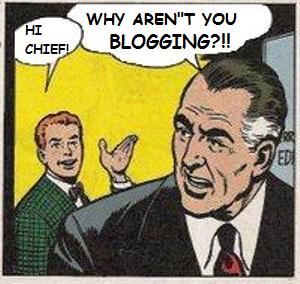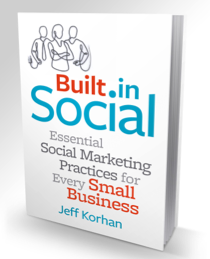
As a consumer yourself, wouldn’t you like to have easy access to fresh updates concerning the products and services you regularly use?
Your customers are no different.
Customers have been conditioned to expect answers whenever they need them. When they don’t get what they want your reputation erodes.
Knowing this, why are so few small businesses actively blogging? I believe it is because they do not understand the practice.
Early blogs were predominantly personal journals consisting of periodic communications on random topics. However, the top business blogs today are some of the most valued sources of fresh and relevant news.
Think of your business blog as a digital magazine for your customers. Quality blog posts are now often considered articles. Even the word blogging is considered passé. Now we simply think of ourselves as publishers.
This new mindset acknowledges that in this digital age every business is now its own media company.
Your business blog should include the following, which you can easily accomplish with a self-hosted WordPress site. WordPress started as a blogging platform, but has now evolved into the world’s leading CMS (Content Management System) for businesses.
#1 – Organized Information
Early blogs used archives and categories to organize information. Just as your business processes must adapt to changing conditions, so too have the methods for successfully blogging. Guide your visitor. Consider adding a “start here” tab that leads to your best articles organized into a series of subject matter tutorials.
#2 – Up-to-Date Information
Google wants what people want, and that is the most up-to-date information they can find on a particular subject. By consistently publishing fresh content to your blog, you are serving both your customers and the search engines that will help you find new ones.
#3 – Relevant Information
The more you blog the more you will learn how to help your customers, particularly if you are paying attention to comments and what earns greater sharing among their social network communities. You’ll soon realize the most relevant issues change slowly, if they change at all.
For example, last week I read a publication that interviewed several business leaders. Nearly every comment eventually circled back to one core challenge – getting new customers and keeping the current ones happy, while of course turning a profit.
Customer acquisition and servicing is a problem that never goes away.
What are the problems in your business that never go away?
Start blogging about them.
Build a content management system using WordPress – a digital business channel (on a domain you own) that regularly addresses the needs of your customers.
They will love you for it.
Isn’t that what any business wants?
About the Author: Jeff Korhan, MBA, is the author of Built-In Social: Essential Social Marketing Practices for Every Small Business and host of This Old New Business podcast.
He helps mainstream businesses adapt their traditional growth practices to a digital world. Connect with Jeff on LinkedIn, Twitter, Facebook, and Google+



